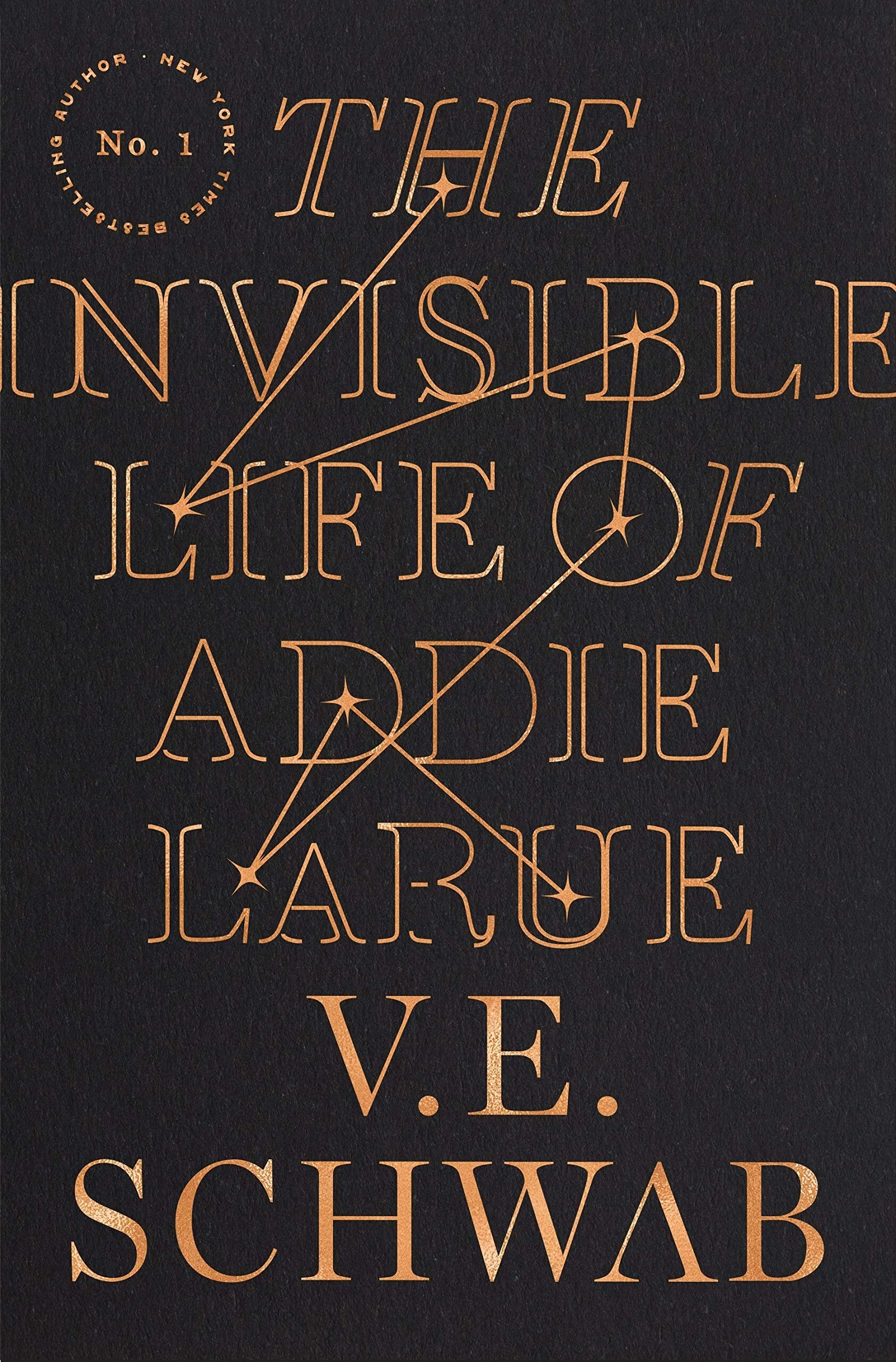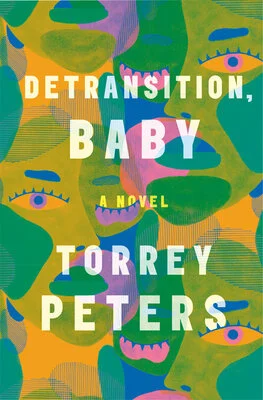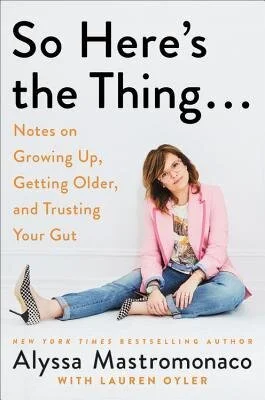The Invisible Life of Addie LaRue by V.E. Schwab
Title: The Invisible Life of Addie LaRue
Author: V.E. Schwab
Published: 2020
Type: Fiction
Pages: 442
“What is a person, if not the marks they leave behind?”
In Brief:
I had mixed feelings about this book. I really loved the premise – it absolutely invaded my imagination, I even dreamt about it repeatedly – but the execution came across like a not-great-YA, and it definitely didn’t merit its length.
Rating: 3.8
Synopsis:
In the early eighteenth century, Addie LaRue makes a deal with the devil. Desperate to escape marriage, she prays to the gods after dark and is approached by a shadowy figure. She asks for freedom, time to live – in return, she offers her soul when she doesn’t want life anymore.
Of course, this is the devil (or a god, or a monster, or the dark – he goes by Luc), so there’s a twist. In return for indefinite life, indefinite youth, Addie will never be remembered by anyone she sees.
It’s not easy. She’s cast out from her family and village, who see her as an intruder. Every time she makes a friend or a lover, they forget her a moment out of sight. Her only ongoing relationship is with Luc, who visits her every year.
Still, she finds a way to make the best of it. To have adventures, fall in love, leave her mark. Then, three hundred difficult years later, someone remembers her – a kind and troubled young man named Henry. They fall in love on borrowed time, and Addie must again enter negotiations with the devil.
Where I’m At:
I’m sure dear readers are very excited to know what I’ve been up to during my hiatus.
Well. I froze my eggs – you can read more about that here. I also got my first vaccine shot!
And… that’s pretty much it. I’m still in my San Francisco apartment, still working from home, still happy with my partner, still obsessed with my cat. I still read, run, bake, and cook a lot. Sometimes I go out to dinner now!
That’s pretty much it.
Regarding this book – it’s a love story, and I think there are pretty obvious connections I could make to my own romantic history; I just don’t particularly feel like it today. I’ve been trying to write it out, but it’s not coming right. I think it’s okay to just let it go; most people reading this know me well enough anyway.
But I could also see a lot of myself in the main characters, Addie and Henry. Addie is much bolder than I am, but with a stubborn kind of optimism, faith in humanity, willingness to take risks or love that friends will point out in me with equal amounts of eye-rolling and affection. Henry is much sadder than me, but intensely sensitive (a word that still makes me grit my teeth) in a way that I can easily sympathize with.
Lastly, I’m sure my reading is colored by the many many hours I spent reading YA as a teenager. Though it’s a complaint even I have about the book, it probably made me somewhat more receptive than someone else might be.
Getting Into it:
There are a lot of things this book does really well. First and foremost is the world-building. The very premise is fascinating, but Schwab takes it a step further by really investing in the details and the logistics of the curse. I found myself dreaming of it, imagining my life in Addie’s shoes, making it seem both fantastic and impressively realistic. Schwab really dwells in how difficult her life was in the early years, as she was homeless and struggling to adjust – I think a lesser book may have glossed over that, or given Addie some kind of out.
Descriptions of characters are very generous and illustrative, even ones with whom the reader gets relatively little time. Of the first man Addie really falls in love with, Schwab writes:
Remy Laurent is laughter bottled into skin. It spills out of him at every turn.
Of Sam, a woman Addie loves and “meets” over and over again:
She smells like the chocolate chip cookies that her neighbor bakes whenever he’s stressed, like the lavender soap she uses to scrub paint from her fingers, the chocolate conditioner she leaves in her curls at night.
For the characters we spend more time with, Schwab does even better – she takes time to dwell in feelings, especially for Henry. The reader gets into his head and heart, whether he’s falling in love with Addie:
He is sugar-high and a little drunk, and happier than he has ever been. Addie is better than any little pink umbrella. She is better than strong whisky on a cold night. Better than anything he’s felt in ages. When Henry is with her, time speeds up, and it doesn’t scare him. When he is with Addie, he feels alive, and it doesn’t hurt. She leans back into him, as if he is the umbrella, and she the one in need of shelter. And Henry holds his breath, as if that will keep the sky aloft.
Or describing his depression:
Other people would call him sensitive, but it is more than that. The dial is broken, the volume turned all the way up. Moments of joy register as brief, but ecstatic. Moments of pain stretch long and unbearably loud… No matter how small, or how big, it feels like his heart is breaking again inside his chest…His heart has a draft. It lets in storms. It lets in everything.
The reader’s heart aches and breaks with him. Or at least mine did.
On that note, I also think Schwab did a very good job capturing Henry’s mental illness, and his struggle with substances. She doesn’t glorify it, nor does she vilify him. It’s a persistent struggle, not easily fixed, part of him without defining him.
A boy is sick of his broken heart. Tired of his storm-filled brain. So he drinks until he cannot feel the pieces scraping together in his chest, until he cannot hear the thunder rolling through his head. He drinks when his friends tell him it’ll be alright. He drinks when they tell him it will pass. He drinks until the bottle is empty and the world gets fuzzy at the edges. It is not enough to ease the pain.
And then! There’s a really great twist involving Henry, which I genuinely didn’t see coming yet found entirely fitting – I hate twists that exist for the sake of being twisty, and don’t really make sense within the context of the story. I don’t want to spoil it for any potential readers, but it’s well-done.
There are also quite a few things the book does rather badly.
It doesn’t deserve to break my less-than-400 rule. The plot really drags – it’s slow throughout, but slogs in the middle. Even though I just said that I liked the descriptions and the way that Schwab took the time to dwell in things, I could have done with less of it. That’s a difficult a delicate balance and ultimately comes out on the side of being too overwrought and flowery. This reminded me of a not-great (though not-terrible!) YA novel (which checks out because the author also writes YA).
On a personal note, I sort of had a bone to pick with the fact that, in her three hundred years, Addie doesn’t really… do anything. Obviously, she has particular challenges, but she also has a major advantage in that she lives forever. You could do a lot of good with that! But she mostly just wanders around, exploring and reading and existing. She doesn’t really grapple with anything significant that doesn’t directly involve her, like slavery or civil rights or revolution. I guess it wasn’t “that kind of book,” but it still irked me. It just could have been much meatier.
But what really bothered me about the book was when it veered into something like a romance between Addie and Luc. The devil! The one who cursed her, who manipulates and torments her across the years. It’s not that straightforward – the relationship begins as being just about sex, and Addie insists that she doesn’t love him. He’s also the only person who remembers her for three centuries.
Of course she has missed him. She can tell herself, as she has told him, that she has only missed being seen, or missed the force of his attention, the intoxication of his presence – but it is more than that. She missed him the way someone might miss the sun in winter, though they still dread its heat. She missed the sound of his voice, the knowing in his touch, the flint-on-stone friction of their conversations, the way they fit together. He is gravity. He is three hundred years of history. He is the only constant in her life, the only one who will always, always remember.
I get that, and it could be something interesting to explore. But there’s a difference, another delicate line between portraying a toxic relationship in a way that pays attention to its nuance, and glamorizing abuse. Unfortunately, think this one falls more on the latter.
I’d be interested in this book without any significant romance for Addie at all – either with Henry or Luc. Henry could have been a friend, a deep and platonic love. Luc could have been her tormenter and yet a familiar face, without the overdone sympathy and occasional “rom-com with the devil” vibe.
I have a hard time saying I recommend this book – in fact, I think I specifically did not when a friend responded to my Instagram story and asked. I might cautiously recommend it to some people with nostalgia for YA and looking for something light. However, I ultimately think that for a book with such a delightful premise, its execution fell disappointingly flat.






